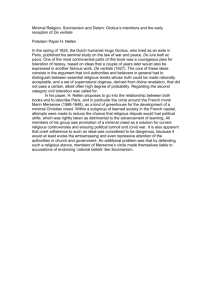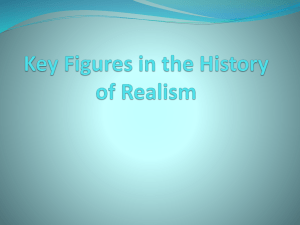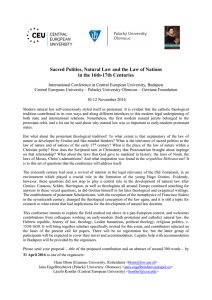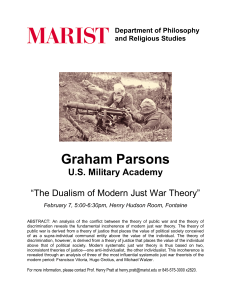Document 11481553
advertisement
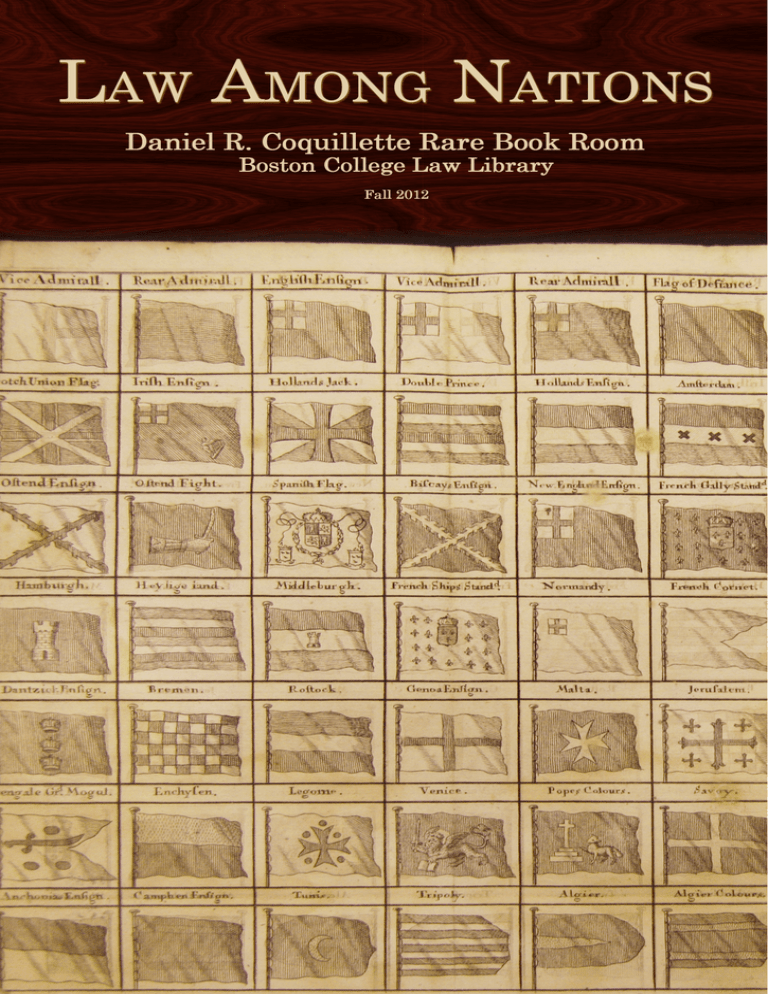
ROMAN LAW AND JUS GENTIUM (Wooden case) Our modern body of international law originated in the Roman law concept of jus gentium, which is often translated as “the law of nations.” Specifically, however, jus gentium was the body of law that governed the status of non-citizens in Rome and their relationships with Roman citizens; jus civile, on the other hand, is the term used for the civil law governing the citizens of a particular state. In order to deal equitably with foreigners in Rome, jus gentium was developed as inter-state dealings became more frequent. Jus gentium was considered to be related to, but not co-extensive with, natural law. Nonetheless, both Gaius and Justinian referred to jus gentium as “the common law of mankind.” INSTITUTIONES, 1654 DIGESTORUM SEU PANDECTARUM SENTATI. FLORENCE, 1553. LIBRI QUINQUAGINTA EX FLORENTINIS PANDECTIS REPRAE- Opened to a page discussing the relationship of jus gentium to natural law, this is the first volume of the famous Florentine or Pisan PANDECTS. The PANDECTS are part of the CORPUS IURIS CIVILIS, the body of Roman law compiled by the Emperor Justinian in the sixth century; they represent the compilation of the writings of legal jurists and had the force of law. This particular volume is part of our complete three volume set and represents the first printed edition of one of the most important Roman law texts. It was printed by the Torrentini, the official printers to the Dukes of Medici, whose arms appear on the front and back of this book. A monument of Renaissance printing, volume one features a magnificent engraved title page, and all three volumes feature numerous engraved capitals. Gift of Daniel R. Coquillette INSTITUTIONES. AMSTERDAM, 1654. This edition of Justinian’s INSTITUTES, the portion of the CORPUS IURIS CIVILIS designed to teach law students, is in its original full vellum binding. It is displayed open to Book One, wherein the concept of jus gentium is discussed: “Those rules presented by natural reason for all men are observed by all peoples alike, and are called the laws of nations” (from the Latin). Gift of Daniel R. Coquillette THE MEDIEVAL CANONISTS (Glass exhibit cases II & III) Even though the law of nations had not yet become an autonomous branch of the law, matters of war, trade, and diplomacy nonetheless were addressed by scholars in the late Middle Ages. Perhaps unsurprisingly, the topic of war—proper justifications, what acts may be committed in wartime— was a common one, just as it is now. The work of the medieval canonists greatly influenced the Spanish writers featured in the next portion of this exhibit. 1 DECRETUM GRATIANI. LYON (FRANCE), 1539. THE DECRETUM is a collection of canon law compiled in the 12th century by Gratian, a canon lawyer from Bologna. This edition is shown open to Causa XXIII of the second part, wherein Gratian admits that war may be lawful if necessary and states that war must directed toward securing peace—not based on avarice or cruelty. SAINT THOMAS AQUINAS, SUMMA THEOLOGICÆ TERTIA PARS. VENICE, 1486. Written in the thirteenth century by Saint Thomas Aquinas (1225-1274), the SUMMA THEOLOGICA has been called “the first systematically complete philosophy of law in the history of jurisprudence, combining the philosophical traditions of Plato, Aristotle, and Stoicism, the law of the Bible, the principles of Roman law, and of Gratian’s DECRETUM and other elements.” The second part of the SUMMA includes a discussion about just war. According to Thomas Aquinas, war must occur for a good and just purpose rather than for self-gain or as an exercise of power; a just war must be waged by a properly instituted authority such as the state; and peace must be a central motive even in the midst of violence. Displayed closed. Notice the original wooden boards—the holes on the right edges would have been for clasps to hold the book shut. Gift of Daniel R. Coquillette POPE GREGORIUS IX, DECRETALES. NUREMBERG, 1496. Gregory IX was Pope of the Roman Catholic Church from 1227 to 1241. He also was an influential canon lawyer and a noted theologian. In 1234, Gregory issued this collection of papal letters or “decretals” on diverse topics and ordered that they be compiled and disseminated. This lovely vellum-bound volume is printed in Latin in red and black, with capital initials hand-colored in blue. It is signed by Cecil Harrison, perhaps a former owner, in 1921. At some point in its long history, this copy was part of the library of the Saint Mary le Beaupres Monastery. The volume is shown open to a decretal from Pope Innocent III regarding the crusaders; it is discussed in more detail in the next entry. Gift of Daniel R. Coquillette POPE GREGORIUS IX, DECRETALES. VENICE, 1584. This is another edition of Gregory IX’s DECRETALES, also opened to Innocent III’s letter on the crusaders, which begins “Quod super his…” The letter was later the subject of famous commentaries by Pope Innocent IV and Hostiensis wherein those two canonists discussed the legal basis on which the crusades rested. Innocent IV felt that the legitimacy of the crusades depended on the fact that the Muslims had taken Christian lands and therefore Christians had the right to reclaim them. Hostiensis, however, felt that Christians could legitimately conquer non-Christian lands, regardless of past ownership (Muldoon). This argument over the legal relationship between the conquering and the conquered continued in the writings of the Spanish scholars who would address Spain’s rights over the conquered Americas and their native peoples. Gift of Michael Hoeflich 2 THE SPANISH SCHOOL (Glass exhibit case IV) Before the arrival of Hugo Grotius in the 17th century, there were important—and often overlooked— contributors to the body of writings on the law of nations. Several of the more notable scholars were Spanish theologians and jurists of the School of Salamanca, founded by Francisco Vitoria (c. 14801546) and continuing the Aristotelian tradition of Thomas Aquinas. These scholars were deeply influenced by the work of the medieval canonists before them. Historically, many legal scholars have started with discussions of Hugo Grotius (one of the featured authors in this exhibit) as the beginning of the classical law of nations. However, more and more, the work of the Spanish jurists is being recognized as a vital step in the evolution of this area of the law. Before 1500, there was no autonomous jurisprudence of the law of nations—no systematic texts or treatises. That started to change here. FRANCISCO VITORIA, DE INDIS ET DE IURE BELLI RELECTIONES. WASHINGTON, 1917. This republication of excerpts from Vitoria’s posthumous work, RELECTIONES THEOLOGICAE, was published by the Carnegie Institution of Washington as part of the CLASSICS OF INTERNATIONAL LAW series. The volume includes two of Vitoria’s lectures, DE INDIS (Of Indians) and DE JURE BELLI (Of the Law of War), which were recorded by a pupil and published after his death. This translation is by John Pawley Bate. In these writings, Vitoria addresses the question of justice in the Spanish conquest of the Americas. In his arguments, he draws heavily on the writings of the medieval canonists regarding the rights of infidels. James Brown Scott, an American expert in the field of international law and the creator of this series, considers Vitoria—not Grotius—to be the father of international law. The volume is open to a summary of the second section of DE INDIS, wherein Vitoria covers many arguments as to why the Spanish do not have the legitimate right to conquer the American native populations. Section three delves into some “legitimate” ways in which the Spanish can exercise power and influence in the Americas. FRANCISCO SUÁREZ, TRACTATUS DE LEGIBUS AC DEO LEGISLATORE. COIMBRA (PORTUGAL), 1612. Francisco Suárez (1548-1617) was a Spanish Jesuit, theologian, philosopher, and one of the founders of “modern” international law. His work is particularly notable for its focus on custom as being a vital source of guidance in the interactions between nations. This is a first edition in vellum binding of Suarez’s magnum opus, in which he laid out his doctrine of natural law and the law of nations. Displayed closed. On loan from the John J. Burns Library of Rare Books and Special Collections, Boston College FRANCISCO SUÁREZ, TRACTATUS DE LEGIBUS AC DEO LEGISLATORE. ANTWERP, 1613. This early edition of Suárez’s work is open to Book Two, in which he discusses natural law and jus gentium. Notice the citations to Plato, Cicero, and Thomas Aquinas. On loan from the John J. Burns Library of Rare Books and Special Collections, Boston College 3 ALBERICO GENTILI, DE IURE BELLI (ON THE LAW OF WAR), HANAU (GERMANY), 1612. Gentili (1552-1608) was an Italian Protestant who immigrated to England and taught as Regius Professor of Civil Law at the University of Oxford. In addition to this treatise on the law of war, he also published a comprehensive work on embassies (DE LEGATIONIBUS LIBRI TRES, 1585). DE IURE BELLI, displayed here closed, was an incredibly important treatise on the law of war that is now considered the most important precursor to Grotius’s master work. Gift of Daniel R. Coquillette HUGO GROTIUS (Glass exhibit case V) Dutch humanist Hugo Grotius (1583-1645) authored two important treatises on the law of nations, both of which are represented here—MARE LIBERUM (Freedom of the Sea) and DE IURE BELLI AC PACIS (Of the Law of War and Peace). The latter is his most famous work and has been called the greatest international law text ever written. It was first relatively comprehensive treatise on the law of nations. Despite the title, the treatise deals not only with the laws of war and peacemaking, but also with subjects such as treaty law and diplomatic law. Written during the upheavals of the Thirty Years War and first published in Paris in 1625, it laid down fundamental principles of law which purported to have the certainty of mathematics and absolute validity in all times and in all places. These principles both provided a standard for measuring the validity of the positive law of any state and also formed the basis for governing the relations between states. It is important to keep in mind the influence that the Vitoria, Suarez, Gentili, and the medieval canonists had on Grotius. The work had enormous influence on the ethical and legal thought of the 17th and 18th centuries and is regarded as the beginning of the law of nature and of nations, the forerunner of modern international law. In particular, one famous passage foreshadowed the idea of international free trade: “… no man has right to obstruct the way of Commerce to any Nation with other that is remote; because the permission of Trade is for the interest of human society, and is not discommodious to any one.” Of all his many works, this one earned Grotius his reputation as the “father of international law.” We are delighted to display multiple editions of DE IURE BELLI AC PACIS here in exhibit case V. HUGO GROTIUS, THREE BOOKS TREATING OF THE RIGHTS OF WAR & PEACE. NEW ENGLISH TRANSLATION BY WILLIAM EVATS. LONDON, 1682. This large-format edition is displayed open to the beautiful dual color title page and a magnificent frontispiece showing a 17th-century war scene. Gift of Daniel R. Coquillette 4 HUGO GROTIUS, DE JURE BELLI AC PACIS LIBRI TRES. AMSTERDAM, 1720. This edition contains the valuable scholarly notes of Jean Barbeyrac. Published with Grotius’ MARE LIBERUM, Amsterdam, 1720. Displayed open to the dual color title page. Gift of Daniel R. Coquillette HUGO GROTIUS, OF THE RIGHTS OF WAR & PEACE. LONDON, 1715. 3 VOLUMES. This beautiful set features gilt stamped decorative bindings; the volumes are displayed closed. Gift of Daniel R. Coquillette HUGO GROTIUS, DE JURE BELLI AC PACIS LIBRI TRES, IN QUIBUS JUS NAUTRAE & GENTIUM, ITEM JURIS PUBLICI PRAECIPUA EXPLICANTUR. AMSTERDAM, 1735. TWO BOOKS IN ONE VOLUME. This lovely book is bound in original vellum with gilt coats of arms on the front and back covers. When closed, you can see remnants of fabric ties that were used to hold the book together. Displayed open to the half-title page and frontispiece. Gift of Daniel R. Coquillette GROTIUS, SELDEN, AND DOMINION OF THE SEA (Glass exhibit case VI) Much of the writing on the law of nations addressed the laws of war and peacemaking, but another important issue was who held dominion over the sea. Displayed here are several important works on the topic. One of the most important divides was between Grotius—who argued in his famous DE MARI LIBERO or MARE LIBERUM that a country could not exercise legal sovereignty over the sea— and the Englishman John Selden—who took the opposite stance. HUGO GROTIUS, DE MARI LIBERO. LEIDEN (NETHERLANDS), 1633. Displayed open to a lovely illustration of a ship. Gift of Daniel R. Coquillette JOHN SELDEN, OF THE DOMINION, OR, OWNERSHIP OF THE SEA (IN LATIN, MARE CLAUSUM) BY JOHN SELDEN. LONDON, 1652. While Grotius argued that the sea was openly navigable by all countries for trade, Selden believed that the sea was as subject to a country’s private dominion as land. This work provided the basis of England’s official position on the seas for over 100 years. Although the argument failed in 5 time as the unfettered expansion of global trade favored Grotius’ position, Selden’s participation in the debate helped launch the field of modern international law, and MARE CLAUSUM remains a classic text (Tarlton). Displayed open to the engraved frontispiece of Britannia commanding the oceans and the facing poem, “Neptune to the Common-wealth of England,” written by the translator, Marchamont Nedham. Gift of Daniel R. Coquillette CHARLES MOLLOY, DE JURE MARITIMO COMMERCE). LONDON, 1707. ET NAVALI (TREATISE OF AFFAIRS MARITIME AND OF Molloy’s famous treatise, which many through many editions in multiple languages, was a standard work on international, commercial and maritime law, even eclipsing Selden’s MARE CLAUSUM as the authority on workaday maritime matters, such as bills of exchange and insurance issues. Displayed open to a magnificent symbolic illustration on two pages preceding the title page. Gift of Daniel R. Coquillette THE MODERN SCHOOL OF NATURAL LAW (Glass exhibit case VII) Influenced by Grotius and his predecessors, an impressive group of natural law scholars began writing major treatises on the law of nations in the seventeenth and eighteenth centuries. Among these were Samuel von Pufendorf, Jean Barbeyrac, Jean-Jacques Burlamaqui, and Christian Wolff, all of whom wrote or edited works featured in this exhibit. SAMUEL PUFENDORF, THE LAW OF NATURE AND NATIONS. LONDON, 1749. Pufendorf (1632-1694), German natural law philosopher, was one of the founders of the naturalist school and a disciple of Hugo Grotius. This is an English edition of his great work DE JURE NATURAE ET GENTIUM, originally published in 1672. The notes are by Jean Barbeyrac. Unlike Grotius, who saw a role for positive law in the form of treaties and international customary law, Pufendorf was a strict naturalist who rejected the existence of a binding positive law of nations. To Pufendorf, the law of nations should be directly derived from natural law and states should be bound by it, just as individuals are. Displayed open to the chapter called “Of the Right of War.” Gift of Frank Williams Oliver CHRISTIAN WOLFF, JUS GENTIUM METHODO SCIENTIFICA PERTRACTATUM (LAW OF NATIONS TREATED ACCORDING TO SCIENTIFIC METHOD). HALLE AN DER SAALE (GERMANY), 1749. Wolff (1679-1754) was a German philosopher and deep believer in the importance of natural law, 6 but he is notable, like Zouche and Bynkershoek, in his insistence on the importance of positive law in the jurisprudence of the law among nations. Wolff “distinguished and separated clearly and unmistakably international law from natural law. He elevated international law to an independent science, which, indeed, may be looked upon as a part of ‘natural international law,’ but as a special and independent part” (Wolff). Displayed closed. Gift of Michael Hoeflich EMER DE VATTEL, THE LAW OF NATIONS. LONDON, 1759-60. Vattel (1714-1767), a Swiss diplomat and disciple of Christian Wolff, wrote his great work on international law, LE DROIT DES GENS OU PRINCIPES DE LA LOI NATURELLE (LAW OF NATIONS) in 1758. This famous treatise quickly eclipsed Wolff’s works and became, along with the works of Grotius and Pufendorf, one of the seminal treatises on the law of nations. Vattel is perhaps best known for his “Golden Rule of Sovereigns,” under which States must treat other States the way they themselves wish to be treated; relatedly, he considered the upholding of treaties as a sacred duty. Displayed here is the first English edition, translated from the original French, open to the dual color title page. Gift of Daniel R. Coquillette JEAN-JACQUES BURLAMAQUI, THE PRINCIPLES OF NATURAL LAW. LONDON, 1748. Originally published in French as LE PRINCIPES DU DROIT NATUREL in 1747, Burlamaqui’s treatise on natural law greatly influenced the drafters of the United States Constitution, particularly in his understanding of checks and balances and his ideas on judicial review. Notably, he was the first philosopher to state the quest for happiness as a natural right, a concept integrated by Thomas Jefferson into the Declaration of Independence. Additionally, Burlamaqui discussed natural law within the context of the law of nations, arguing for a natural, national right of selfdefense; a natural right for humanitarian intervention to aid people subjected to a tyrannical government; and the right to revolt against a tyrannical government (Kopel). Displayed here is the first English edition, shown closed. Gift of Daniel R. Coquillette THE POSITIVISTS (Glass exhibit case VIII) The positivists, led by English jurist Richard Zouche (1590-1661) and later Dutch jurist Cornelius van Bynkershoek (1673-1743), felt that the true law of nations was dictated by treaty law and international customary law—not by natural law. The distinction between the natural lawyers and positivists often blurs; Vattel, for instance, believed in a “necessary” law of nations that was based on natural law, as well as a positive law of nations that requires the consent of the sovereign state in order to be bound. RICHARD ZOUCHE, IURIS ET IUDICII FECIALIS, SIVE IURIS INTER GENTES, ET QUAESTIONUM DE EODEM EXPLICATIO (AN EXPOSITION OF FECIAL LAW AND PROCEDURE LAW BETWEEN NATIONS AND QUESTIONS CONCERNING THE SAME ). OXFORD, 1650. Featured here is a first edition of Zouche’s famous treatise, often described as the first scientific 7 manual covering the field of the law of nations. Zouche is considered by some to be the first positivist in the field of international law, as custom and contemporary precedents are at the forefront of his writings. He did not coin the phrase "jus inter gentes" ("law among nations") but did popularize the term, which is seen by many as more apt than "jus gentium" ("law of nations"). The volume, in a contemporary calf binding, is bound with a second work by Zouche, his SPECIMEN QUAESTIONUM JURIS CIVILIS, the only edition, published in 1653 and also at Oxford. The second work is an outline of a reading list on the civil law for students. It is displayed open to the title page of IURIS ET IUDICII FECIALIS. CORNELIUS VAN BYNKERSHOEK, QUAESTIONUM JURIS PUBLICI. LEIDEN (NETHERLANDS), 1751. Book One of the positivist’s famous treatise covers the laws of war. The Dutchman addresses such issues as the definition of war; whether a formal declaration of war is necessary; issues of contraband and blockade; and the treatment of vanquished enemies. Displayed open to the title page. Gift of Michael Hoeflich GEORG FRIEDRICH VON MARTENS, SUMMARY OF THE LAW OF NATIONS. PHILADELPHIA, 1795. Dedicated to George Washington by Philadelphia printer Thomas Bradford and translated from French by William Corbett, this is the first American edition of Martens’ well-known treatise, one of the last to come out of the classical period of international law. Reflecting his positivist philosophy toward the law of nations, the work includes a list of the principal treaties, concluded since the year 1748 down to the present time, indicating the works in which they are to be found. This lovely volume, shown closed in its original binding, belonged to Robert Treat Paine, founding father and signer of the Declaration of Independence; it includes his signature. Gift of Daniel R. Coquillette GEORG FRIEDRICH VON MARTENS, SUMMARY OF THE LAW OF NATIONS. PHILADELPHIA, 1795. Another copy of the first American edition, this one is displayed open to a list of principal treaties and where to locate the text—perhaps an unsurprising addition for a positivist like Martens. BLACKSTONE AND BENTHAM (Glass exhibit case IX) With the exception of Richard Zouche, the major figures in the development of modern international law were Continental scholars. However, the contributions of two Englishmen deserve a mention 8 here. William Blackstone’s famous COMMENTARIES ON THE LAW OF ENGLAND includes a section in Book Four called “Of Offences Against the Law of Nations,” in which he lays out a quite practical discussion of this area of law, including questions regarding passports, rights of ambassadors and piracy. The law of nations had gone from being an undeveloped area of jurisprudence, supported by no autonomous body of legal literature, to being a fixture in Blackstone’s attempt to “codify” to common law of England—a common law that he viewed as encompassing the law of nations. Jeremy Bentham, English utilitarian philosopher and jurist, left a mark on this area of the law by coining the term “international law”—which he felt was more apt than “law of nations” or “law among nations.” WILLIAM BLACKSTONE, COMMENTARIES ON THE LAWS OF ENGLAND. OXFORD, 1769. (VOLUME 4) This is the first edition of Volume 4—part of our complete set. It is displayed open to Book 4, Chapter 5, “Of Offences Against the Law of Nations.” JEREMY BENTHAM, THE WORKS OF JEREMY BENTHAM. EDINBURGH, 1843. The full set of Bentham’s works is on display, but the first volume is open to his 1789 work, AN INTRODUCTION TO THE PRINCIPLES OF MORALS AND LEGISLATION. Take a look at the far righthand column, where Bentham discusses his preference for the term “international law.” Gift of Frank Williams Oliver THE LAW OF NATIONS IN THE EARLY UNITED STATES (wooden case) Issues implicating the law of nations were often at the forefront of colonial and early American lawyers’ minds. On a basic level, natural law and international law are deeply intertwined. In the years leading up to the Revolutionary War, theories of law based upon universal principles of natural rights became more popular. Patriots like John Adams, Thomas Jefferson, and Benjamin Franklin were reading Grotius, Vattel, and Burlamaqui, among others. On a more practical and specific level, during and after the American Revolution, there were questions about what to do with captured ships and how to engage in diplomacy and treaty-making. Displayed in this case are examples of American editions of influential Continental writers, as well as a first edition of James Kent’s COMMENTARIES—America’s answer to Blackstone’s famous English work. Notice the very first topic covered is the law of nations. JAMES KENT, COMMENTARIES ON AMERICAN LAW. NEW YORK, 1826-1830. FOUR VOLUMES. This famous treatise on American law is based on the lectures given by Kent (1763-1847) during his tenure as Professor of Law at Columbia College. Kent, an avowed student of Grotius, Pufendorf, Bynkershoek, and Vattel, began the first volume of his COMMENTARIES with a discussion of the law of nations. EMER DE VATTEL, THE LAW OF NATIONS. NORTHAMPTON (MASS.), 1820. This is an early American edition of Vattel’s work, illustrating how in demand his treatise was 9 even in the relatively new United States. It was hugely impactful here and was cited more than any other international law treatise by early American courts. Gift of Frank Williams Oliver JEAN-JACQUES BURLAMAQUI, THE PRINCIPLES OF NATURAL LAW. CAMBRIDGE (MASS.), 1807. Displayed closed, this is an early American edition of Burlamaqui’s famous work, the first English edition of which is featured in exhibit case VII. THE LEGACY Today, international law is one of the most vibrant and important areas of legal practice and theory. A quick search in most library catalogs will yield thousands of titles, with more and more being published every year. These works are the part of the legacy of the Roman jurists, the canonists, Vitoria and the Spanish school, Grotius, Pufendorf, Vattel, and the other thinkers featured in this exhibit whose views still inform the ways in which nations are expected to interact with one another. For example, in a nice blend of positivist and naturalist philosophy, Article 38 of the Statute of the International Court of Justice recognizes the importance of customs and conventions, while also recognizing that they are not the exclusive source of international law. By examining the thinkers who developed the philosophies underlying our modern international jurisprudence, we can think more critically about how to craft the most fair and just body of law among nations for the modern world. The cover art for this catalog is from ALEXANDER JUSTICE, A GENERAL TREATISE OF THE DOMINION AND LAWS OF THE SEA. LONDON, 1705. Neither this work nor the author is particularly famous, but the book itself is an impressive feat of early 18th century printing. The volume is not displayed in the physical exhibit because of the fragility of the beautiful fold-out images of the flags of various nations, but we were excited to be able to incorporate it into the catalog design. This exhibit was curated by Laurel Davis, Curator of Rare Books at Boston College Law School. Many thanks to Matthew Patella, Boston College Graduate School of Arts & Science, Political Science, Class of 2013, for his help in choosing the works displayed, and to Lily Olson, Law Library Assistant, for her invaluable assistance in creating this catalog. 10 BIBLIOGRAPHY Martin S. Flaherty, et al. International Law, in THE OXFORD INTERNATIONAL ENCYCLOPEDIA OF LEGAL HISTORY. (Stanley N. Katz ed., 2009). The Oxford International Encyclopedia of Legal History: (e-reference edition). Oxford University Press. Boston College Law. 8 August 2012 http://www.oxford-legalhistory.com/entry? entry=t277.e417-s3 Stacey M. Gahagan, Returning to Vattel: A “Gentlemen’s Agreement” for the Twenty-First Century, 37 N.C. J. INT'L L. & COM. REG. 847 (Spring 2012). M. W. Janis, Jeremy Bentham and the Fashioning of ‘International Law, 78 AM. J. INT’L L. 405-41 (1984). “Jus gentium” in ENCYCLOPAEDIC DICTIONARY INTERNATIONAL LAW. Boston College Libraries. 7 June 2012 http://www.oxfordreference.com.proxy.bc.edu/view/ENTRY.html?subview=Main&entry=t289.e1241 James Kent, Autobiographical Sketch of James Kent, Southern Law Review 381-91 (1872). David B. Kopel, et al. The Human Right of Self-Defense. 22 BYU J. PUB. L. 43 (2007) James Muldoon, Medieval Canon Law and the Formation of International Law, 81 ZIETSCHRIFT DER SAVIGNYSTIFTUNG FUR RECHTSGESCHICHTE 64 (1995). Randall Lesaffer, The Classical Law of Nations (1500-1800) in RESEARCH HANDBOOK ON THE THEORY AND HISTORY OF INTERNATIONAL LAW (Alexander Orakhelashvili & Edward Elgar eds., 2011). Klaus Luig & Alexa Nieschlag, Pufendorf, Samuel von in THE OXFORD INTERNATIONAL ENCYCLOPEDIA OF LEGAL HISTORY. (Stanley N. Katz ed, 2009). The Oxford International Encyclopedia of Legal History: (e-reference edition). Oxford University Press. Boston College Law. 13 August 2012 http://www.oxford-legalhistory.com/entry? entry=t277.e667 Jesse S. Reeves, The Influence of the Law of Nature upon International Law in the United States, 3 AM. J. INT'L L. 547 (1909). Andrew Stephenson, A HISTORY OF ROMAN LAW WITH A COMMENTARY ON THE INSTITUTES OF GAIUS AND JUSTINIAN (1912) (“the common law of mankind”) "Francisco Suárez" in ENCYCLOPÆDIA BRITANNICA. Encyclopædia Britannica Online Academic Edition. Encyclopædia Britannica Inc., 2012. Web. 10 Aug. 2012. <http://www.britannica.com/EBchecked/topic/570449/ Francisco-Suarez>. Tarlton Law Library Rare Books/Special Collections, “The Works of John Selden.” http://tarlton.law.utexas.edu/ exhibits/selden/mare_clausum.html Sergio Moratiel Villa, The Philosophy of International Law: Suárez, Grotius and Epigones, 31-10-1997 Article, INTERNATIONAL REVIEW OF THE RED CROSS, NO. 320. http://www.icrc.org/eng/resources/documents/ misc/57jnv9.htm Christian Wolff, Jus Gentium Methodo Scientifica Pertractatum. Transl. Otfried Nippold & Joseph H. Drake, CLASSIC OF INTERNATIONAL LAW, at p. xxxviii (Oxford & London, 1934). Jonathan Ziskind, International Law and Ancient Sources: Grotius and Selden, 35(4) THE REVIEW OF POLITICS 537-559 (Oct. 1973), pp. 537-559. 11
